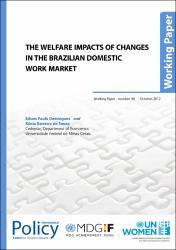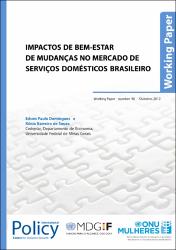Please use this identifier to cite or link to this item:
https://repositorio.ipea.gov.br/handle/11058/15881Files in This Item:
| File | Description | Size | Format | |
|---|---|---|---|---|
| en_IPCWorkingPaper96.pdf | 751.54 kB | Adobe PDF |  View/Open | |
| pt-br_IPCWorkingPaper96.pdf | 829.99 kB | Adobe PDF |  View/Open |
| Title: | The Welfare Impacts of Changes in the Brazilian Domestic Work Market |
| Other Titles: | Impactos de Bem-Estar de Mudanças no Mercado de Serviços Domésticos Brasileiro |
| Authors: | Domingues, Edson Paulo Souza, Kênia Barreiro de |
| Abstract: | Domestic work encompasses a series of activities such as cleaning, housekeeping, cooking, washing clothes and caring for children, elderly or disabled people and pets, among others. Although domestic workers may perform different types of activities, two features are common to all of them: the work is paid, and the work is done in a home other than that of the worker him/herself (ILO, 2011th; ILO, 2011ab). Because of these and other socio-economic characteristics, paid domestic workers are similar in a number of way, namely: i) predominance of female workers; ii) low wages; iii) the employer is an individual; iv) legislation does not follow the Consolidated Labour Laws (Consolidação das Leis do Trabalho – CLT)—in fact, such labour rights are mentioned as exceptions in the Federal Constitution (Constituição Federal – CF) itself; and v) there is a high degree of labour informality (ILO, 2011c; IBGE, 2012th). (…) O trabalho doméstico compreende uma série de atividades, como: limpeza; arrumação; cozinha; cuidados com o vestuário; cuidados com crianças, idosos, pessoas com deficiência, animais; entre outras. Embora podendo desempenhar atividades distintas, duas características são comuns a esses trabalhadores: o trabalho é remunerado e realizado em domicílio que não o do próprio trabalhador (OIT, 2011a; OIT, 2011b). Por essas e outras características socioeconômicas, o grupo de trabalhadores domésticos remunerados possui uma série de peculiaridades, entre as quais se destacam: i) predominam trabalhadoras do sexo feminino; ii) são pagos baixos salários; iii) o empregador é uma pessoa física; iv) a legislação não acompanha a Consolidação das Leis do Trabalho (CLT), sendo até mesmo colocada como exceção os direitos trabalhistas pela própria Constituição Federal (CF); e v) há alto índice de informalidade (OIT, 2011c; IBGE, 2012a)... |
| metadata.dc.rights.holder: | International Policy Centre for Inclusive Growth United Nations Development Programme |
| metadata.dc.rights.license: | O texto e dados desta publicação podem ser reproduzidos desde que as fontes sejam citadas. Reproduções com fins comerciais são proibidas. |
| metadata.dc.type: | Working Paper |
| Appears in Collections: | Publicações do IPC-IG |
Items in DSpace are protected by copyright, with all rights reserved, unless otherwise indicated.

